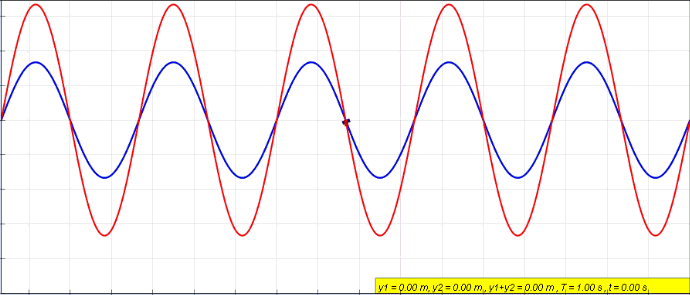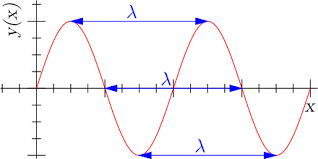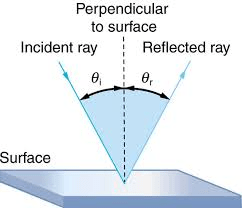Most waves need a medium to travel through. Give an example of a medium.
Air, water, glass, metal, etc. (Any physical material)
Draw a longitudinal wave.
AND
Draw a transverse wave.
This is the speed of sound in room temperature air.
343 m/s
This is the only type of wave that does not require a medium to travel through.
Light Waves
Waves transfer ______ through a medium
Energy
Explain one difference between the waves created by a strong earthquake versus the waves created by a weak earthquake. (Correctly use any of the wave describing words in your answer: Amplitude, wavelength, frequency, or speed)
Strong: Large wave amplitude
Weak: Small wave amplitude
This type of interference is needed to create standing waves.
Constructive AND Destructive interference
This is the speed of light (in meters per second)
c = 300,000,000 m/s
c = speed of light = 3*10^8 m/s
Determine the amplitude and the wavelength of the wave shown.

Wavelength = 8 units
Amplitude = 4 units
When a rock is thrown into a pond, what type(s) of wave is created?
Transverse (perpendicular disturbance) AND longitudinal (compression disturbance)

This is a picture of the ____ harmonic in an open ended tube.
1st
L_(open)=(n*lambda_(n))/2
Light travels through Honey at a speed of v=176,000,000 m/s. Calculate the index of refraction, n, of Honey.
n = 1.7
n=c/v
A string is disturbed in such a way so that 10 waves are made every 5 seconds.
Calculate the period of these waves.
Calculate the frequency of these waves.
Period: 0.5 seconds
Frequency: 2 Hz or Hertz (f=1/T ... f=1/(0.5)=2)
You observe a wave passing in front of you at 60 m/s. The wavelength of the wave is measured to be 25 cm. Calculate the frequency of the wave.
240 Hz
v=lambda*f
60m/s=lambda*0.25m
60/0.25 = 240
This is a picture of the _______ harmonic for a closed end tube.

3rd
L_(closed)=(n*lambda_(n))/4
A light ray is passing from water (index of refraction 1.33) into glass (index of refraction 1.50). If the angle of refraction in the glass is 25°, what was the angle of incidence in the water?
theta_i=28.46^o
n_(1)sin(theta_1)=n_2sin(theta_2)
When waves reach a boundary (the plane that separates two different materials/mediums) part of the wave is _________, part of the wave is __________, and part of the wave is ____________.
Reflected back into the original medium, Absorbed by the boundary, and Transmitted through the new medium.
A device moves up and down to create waves on a string. The device creates 1 wave every 2 seconds. The wavelength of each wave is 7.5 meters. Calculate the velocity (speed) of the waves on the string.
v =3.75 m/s
Period = 2 seconds Frequency = 1/period = 1/2 = 0.5 Hz
Wavelength = 7.5 m
v=0.5 Hz * 7.5 m
Draw a picture of a sound wave that bounces off of a wall making sure to follow the law of reflection.
Angle of incidence = Angle of reflection

Draw the image of the object shown when placed in front of a concave mirror.
This image is real, inverted, and larger than the object.

